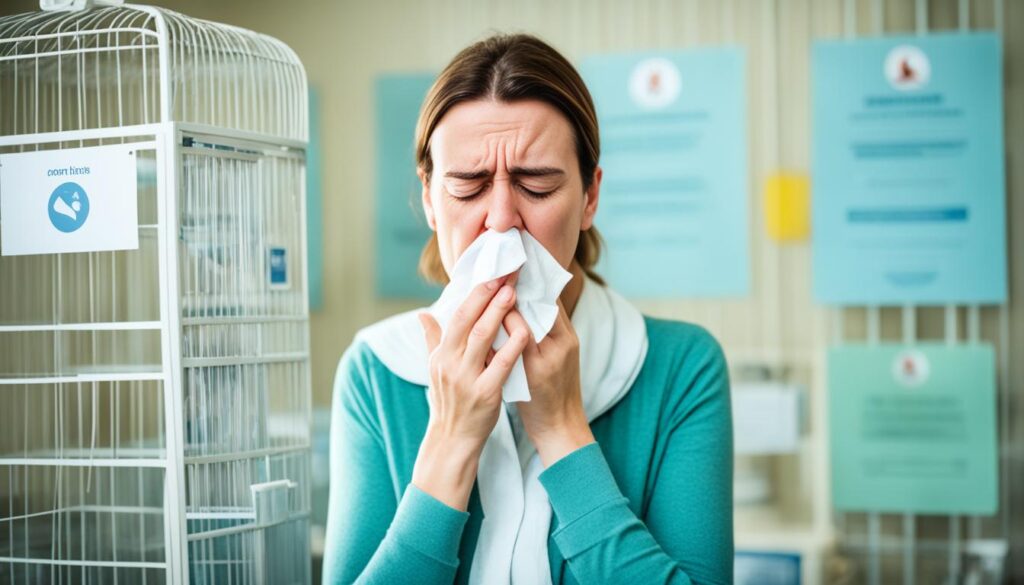Did you realize that bird allergies are actually more prevalent than many people realize? While cats and dogs tend to get all the attention in terms of pet allergies, any animal with fur or feathers has the potential to cause an allergic reaction. This includes our avian companions, birds!
Bird allergies are primarily caused by the mites that live in bird feathers, as well as the fine dust found in bird droppings. These allergens can lead to a range of symptoms, such as chest tightness, wheezing, congestion, coughing, itchy or watery eyes, and even skin rashes.
If you suspect you have a bird allergy, it’s crucial to seek medical advice for proper diagnosis and explore relief options. Don’t let bird allergies clip your wings – learn how to manage them effectively.
Key Takeaways:
- Bird allergies are more common than many people realize, extending beyond the usual suspects of cats and dogs.
- Mites in bird feathers and fine dust in bird droppings are the primary allergens that trigger bird allergies.
- Symptoms of bird allergy can include chest tightness, congestion, coughing, itchy or watery eyes, and skin rashes.
- If you suspect you have a bird allergy, it’s essential to consult a healthcare professional for proper diagnosis and discuss relief options.
- Managing bird allergies may involve creating pet-free zones, using medication, exploring immunotherapy, and utilizing air purifiers to reduce allergens.
Common Pet Allergies
Pet allergies can affect individuals in various ways, and it’s not just limited to cats and dogs. There are several common pet allergies that people may experience, each with their own set of allergens and symptoms.
Dogs: Allergies to dogs are often triggered by proteins found in their dander, saliva, urine, and even their sweat. These allergens can easily become airborne or cling to surfaces, leading to allergic reactions.
Cats: Cats are known for producing allergens in their dander, which are tiny particles of dead skin that can easily become airborne. Cat allergens can also be found in their saliva and urine, making it important to maintain good hygiene and cleanliness.
Small Rodents and Rabbits: Despite their small size, small rodents like hamsters and guinea pigs, as well as rabbits, can also cause allergies. Allergens are found in their hair, dander, and saliva, which can trigger allergic reactions in susceptible individuals. Chemicals present in their urine can also contribute to allergic symptoms.
Birds: Birds, such as parrots or canaries, can be a common allergen due to the mites found in their feathers and the dust in their droppings. These allergens can become airborne and cause respiratory issues and allergic reactions.
Horses: Horse allergies are less common but can still affect some individuals. The primary allergen is horse dander, which consists of tiny particles of dead skin that can easily become airborne and trigger allergic reactions.
It’s important to note that pet allergies can vary from person to person, and some individuals may be more sensitive to certain allergens than others. If you suspect you have a pet allergy, it is advisable to consult with a healthcare professional for proper diagnosis and guidance on managing your symptoms.

Symptoms of Bird Allergy
Bird allergy symptoms can vary from person to person, but they usually involve a range of discomforts. The most common symptoms of bird allergy include:
- Chest tightness: This is often described as a feeling of pressure or heaviness in the chest.
- Congestion: Many individuals experience nasal congestion or a stuffy nose as a result of bird allergy.
- Coughing: Allergic reactions to birds can lead to persistent coughing.
- Itchy eyes: Bird allergy often causes itching, redness, and irritation in the eyes.
- Skin rash: Some individuals may develop a rash or hives on their skin in response to bird allergens.
In addition to these classic symptoms, bird allergy can also cause other discomforts such as:
- Facial pressure or pain: Some people may experience pressure or pain in the face, particularly around the sinuses.
- Frequent waking during the night: Allergy symptoms may disrupt sleep, leading to frequent waking.
- Swelling under the eyes: In certain cases, swelling under the eyes may appear bluish in color.
It is important to note that these symptoms can be similar to those of a common cold. However, if the symptoms persist for more than two weeks or are recurrent, it is advisable to consult a doctor for further evaluation and potential allergy testing.

Understanding the symptoms of bird allergy is crucial in identifying and managing this type of pet allergy. If you experience any of these symptoms after being exposed to birds, it is recommended to seek medical advice for proper diagnosis and to explore appropriate treatment and relief options.
Relief Options for Bird Allergy
If you are allergic to birds or other pets, there are several relief options you can explore to manage your symptoms effectively. Here are some recommendations:
- Keep your pet out of your bedroom and establish pet-free zones in your home. This will help minimize your exposure to bird allergens and create a sanctuary where you can find relief.
- Regularly bathe and groom your pet to reduce allergens that accumulate on their fur or feathers. This can significantly alleviate your symptoms.
- Clean pet areas and surfaces frequently to remove any accumulated allergens. Vacuuming with a high-efficiency particulate air (HEPA) filter can also help eliminate airborne allergens effectively.
- Consider using synthetic pillows instead of feather pillows to avoid further exposure to bird allergens while you sleep.
- Over-the-counter allergy medications, such as antihistamines, can provide short-term relief from symptoms like itchy eyes and congestion. However, consult with your doctor or pharmacist before taking any medication.
- Allergy shots, also known as immunotherapy, can be a long-term solution for managing bird allergies. This treatment gradually exposes you to small amounts of the allergen, helping your immune system build tolerance over time.
- Using an air purifier in your home can help remove airborne allergens, including bird dander and dust. Consider investing in an air purifier with a HEPA filter for optimal results.
- Covering HVAC vents with cheesecloth can prevent bird allergens from circulating throughout your home, further reducing your exposure.
By implementing these relief options, you can create a more comfortable living environment and minimize the impact of bird allergies on your daily life.

“If you are allergic to birds or other pets, there are several relief options you can explore. By implementing these strategies, you can create a pet-friendly home environment while minimizing the impact of bird allergies on your health and well-being.”
Diagnosis and Treatment Options
If you suspect you have a bird allergy, it is important to see a doctor for proper diagnosis. Our doctors are experts in diagnosing and treating allergies, including bird allergies. They will start by conducting a physical examination and evaluating your symptoms. To confirm the presence of a bird allergy, they may recommend allergy tests such as an allergy skin test or a blood test.
An allergy skin test involves applying small amounts of allergens, including bird dander, onto your skin and monitoring for any allergic reactions. This test is safe and reliable, providing quick results that can help determine the specific triggers of your allergy.
A blood test, also known as a specific IgE test, measures the level of allergy-related antibodies in your blood. It can detect the presence of specific antibodies to bird allergens, confirming an allergic response.
Once diagnosed with a bird allergy, our doctors will discuss various treatment options with you. These options may include medications to manage your symptoms, such as antihistamines to relieve itching, corticosteroids to reduce inflammation, and decongestants to alleviate nasal congestion.
For individuals with severe bird allergies or those who do not find sufficient relief from medications, our doctors may recommend immunotherapy. Immunotherapy involves gradually exposing you to increasing doses of bird allergens to desensitize your immune system. This can help reduce the severity of your allergic reactions over time and provide long-term relief.
Our team of medical professionals is committed to providing comprehensive care for individuals with bird allergies. We will work closely with you to develop a personalized treatment plan that addresses your specific needs and helps you manage your symptoms effectively.

Summary of Diagnosis and Treatment Options
| Diagnosis | Treatment |
|---|---|
| Physical examination | Medication (antihistamines, corticosteroids, decongestants) |
| Allergy skin test | Immunotherapy |
| Blood test |
Conclusion
Bird allergy is a common yet often overlooked type of pet allergy. Many people associate allergies with cats and dogs, but birds can also be a significant trigger for allergic reactions. By understanding the symptoms and exploring relief options, individuals with bird allergies can effectively manage their condition and find relief.
If you suspect you have a bird allergy, it’s important to seek medical advice for proper diagnosis. A healthcare professional can help determine the cause of your symptoms and provide guidance on treatment options. Whether it’s through medication, immunotherapy, or lifestyle changes, there are various ways to address bird allergies and improve your quality of life.
Managing bird allergies involves more than just avoiding contact with birds. Establishing pet-free zones in your home, regularly cleaning your living areas, and using air purifiers can help reduce allergens. Additionally, over-the-counter medications like antihistamines can provide temporary relief, while immunotherapy offers a long-term solution by desensitizing your immune system.
By taking proactive steps and working closely with your healthcare provider, you can effectively manage bird allergies and enjoy a healthier, more comfortable living environment. Don’t let bird allergies restrict your daily life – seek the right diagnosis and treatment to take control of your symptoms and find lasting relief.









